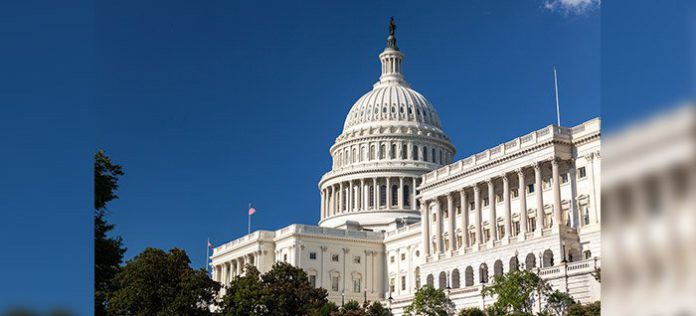

With 33 states having legalized marijuana in some form, cannabis-related companies and banks that want their business have been looking for signs of a breakthrough that will make cannabis banking easier.
They might get one in the form of the SAFE Banking Act, which would remove many regulatory risks that have caused banks to shy away from knowingly serving the cannabis industry. The bill passed the U.S. House of Representatives Sept. 28 on a bipartisan 321-103 vote. The Secure and Fair Enforcement Act of 2019, also known as the SAFE Banking Act, is expected to get a Senate committee hearing before the end of the year.
While the SAFE Banking Act has the best prospects of any federal cannabis banking bill to date, it’s a narrow solution to a complicated problem, according to panelists at a CBA CLE presentation Wednesday. Christian Sederberg, a founding partner of cannabis law firm Vicente Sederberg in Denver, and Jenifer Waller, COO of the Colorado Bankers Association, laid out the challenges banks face in doing business with marijuana-related businesses, or MRBs. Sederberg and Waller also broke down the SAFE Banking Act and issues it would and would not address in MRB banking.
The SAFE Banking Act would prohibit federal banking regulators, like the Federal Reserve or FDIC, from penalizing banks for providing services to legal MRBs. It would also ban regulators from trying to influence banks away from MRB customers. The bill, however, wouldn’t legalize marijuana in any sense. It remains federally outlawed under the Controlled Substances Act.
“I think everyone in the room knows that that is where cannabis is parked,” Waller said. “That is the challenge. That’s what makes it illegal for us to serve the industry still, technically.”
According to the Financial Crimes Enforcement Network, 553 banks were serving the cannabis industry as of June 30, 2019 — up from 334 a year prior.
While more banks are providing services to the cannabis industry, to do so, they have to satisfy anti-money-laundering laws, such as the Bank Secrecy Act. In 2014, FinCEN and the Department of Justice issued guidance to banks clarifying the greater due diligence and reporting requirements they and MRB customers must follow.
Marijuana businesses seeking bank accounts must “bare their soul to the bank,” Waller said. “The bank needs to know that every penny brought into that business is coming from a legitimate legal source, and that becomes pretty challenging.”
The U.S. House of Representatives in late September passed The SAFE Banking Act, which would give banks more regulatory room to lawfully serve marijuana businesses. / LAW WEEK FILE
In theory, banks risk losing their FDIC insurance or their master account from the Fed if they’re found in noncompliance. Sederberg and Waller said, however, they haven’t heard of any bank experiencing either scenario just because it was doing business with MRBs.
Waller said there appears to be a shift in attitudes lately among regulators. In April, a group of Federal Reserve branch presidents asked for clarity on cannabis banking rules.
In 2012, when Colorado voters approved recreational marijuana legalization, about 20% of the state’s cannabis industry had bank accounts, and mostly through personal accounts, Sederberg said. He estimates that in the seven years since, “that number has almost flipped … So we have seen some real progress.”
The SAFE Banking Act has some “pretty important” prohibitions on federal regulators acting against banks for serving MRBs, Waller said.
It would also stop state regulators from taking adverse action against a loan made to someone tied to a marijuana business, she added. Waller said there might be only two marijuana-related loans on the books in Colorado currently, if that, “because there’s not enough security in that area to ensure the bank wouldn’t be required to write off that loan.”
Waller said one thing that she “loves” about the act is it gives banks more leniency if they “accidentally” serve an MRB. “You still have to know your customer, you still have to identify if somewhere something went wrong in that process, but it gives [you] additional protection if [you’ve] accidentally banked marijuana.”
One of the limitations bankers see in the SAFE Banking Act, in its current form, is that it doesn’t explicitly address money going across state lines, Waller said. Bankers would worry that the bill still leaves them vulnerable to anti-money laundering enforcement if an authority chose to go after them, she added.
Sederberg said that if lawmakers amended the bill to more clearly allow interstate transmission of cannabis-sourced funds, they risk tipping off lawmakers who don’t want cannabis money in their states, driving them to reject the bill.
An attendee commented that if the act were left “open” on the interstate transmission question, it might become an issue that ends up in front of a federal judge. Sederberg responded that if the language were left ambiguous, the bigger impact would be that more banks would continue to avoid banking with cannabis clients.
“I don’t see it becoming an issue in the sense of a case,” Sederberg said. “I see it more becoming an issue of just having a chilling effect on some banks doing business.”
Waller said that if the SAFE Banking Act passes, she wouldn’t expect banks everywhere to start opening accounts with cannabis customers. She expects more of a 50-50 split between banks with MRB accounts and banks without.
The SAFE Banking Act isn’t the only promising sign the cannabis industry has seen on Capitol Hill lately. On Wednesday, the House Judiciary Committee approved a bill that would remove marijuana from the Controlled Substances Act. The Marijuana Opportunity Reinvestment and Expungement Act of 2019, or MORE Act, passed in a 24-10 vote and is headed for the House floor.
— Doug Chartier

